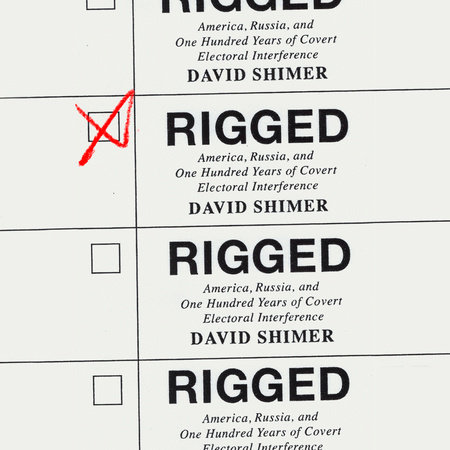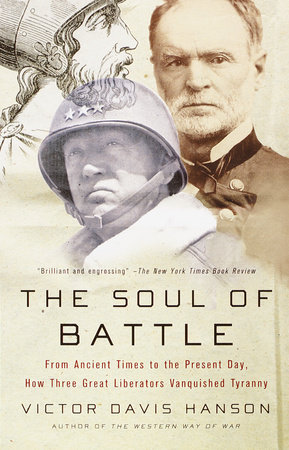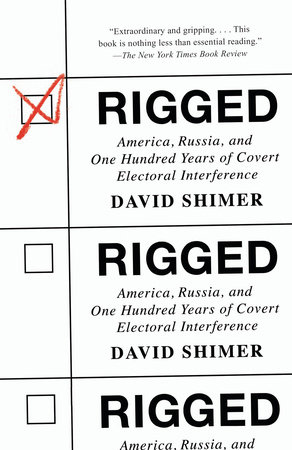

Rigged
By David Shimer
By David Shimer
By David Shimer
By David Shimer
By David Shimer
Read by Kevin R. Free
By David Shimer
Read by Kevin R. Free
Category: Politics | 20th Century U.S. History
Category: Politics | 20th Century U.S. History
Category: Politics | 20th Century U.S. History | Audiobooks

-
$17.00
Oct 05, 2021 | ISBN 9780593081969
-
Jun 30, 2020 | ISBN 9780525659013
-
Jun 30, 2020 | ISBN 9780593339749
654 Minutes
Buy the Audiobook Download:
YOU MAY ALSO LIKE

Collecting Agates and Jaspers of North America

The German Empire

How the Canyon Became Grand

Lone Star 01
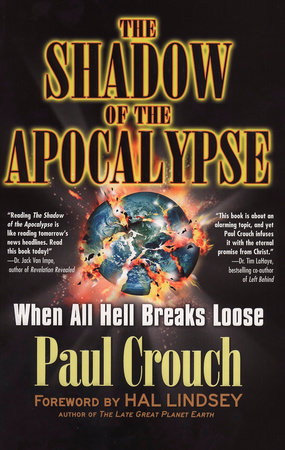
The Shadow of the Apocalypse

The Decline and Fall of the British Empire, 1781-1997

Supernatural
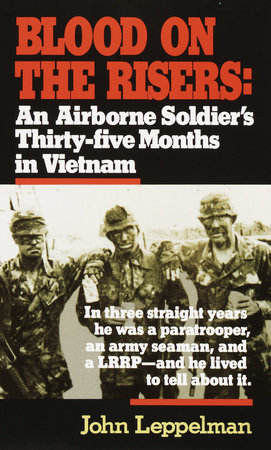
Blood on the Risers
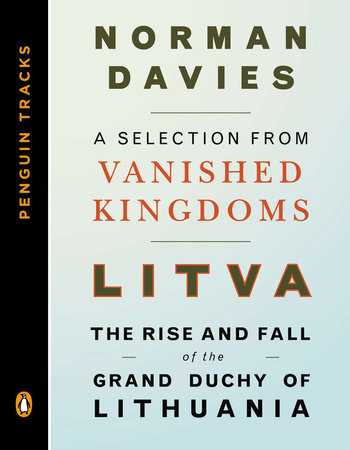
Litva: The Rise and Fall of the Grand Duchy of Lithuania
Praise
A New York Times Editors’ Choice Book • A Washington Post Notable Work of Nonfiction • Named one of the five best books in Politics & Current Events by the 2020 Outstanding Work of Literature Awards
“This is a brilliant, eye-opening, and riveting book. Shimer’s analysis of foreign interference in elections, historical and contemporary, is unmatched. It should be the baseline for any future discussions about this urgent threat to our democracy.”
—Jake Sullivan, Former Director of Policy Planning, State Department
“In his absorbing new book, Rigged, David Shimer argues that the Russia story is far older, and the risks to U.S. electoral security far greater, than we imagined, particularly as a new election approaches.”
—Carlos Lozada, The Washington Post
“This pioneering and judicious history of foreign intervention in elections should be read by everyone who wants to defend democracy now.”
—Timothy Snyder, author of On Tyranny
“This new and astonishing book by David Shimer will help rescue our democracy. I read every word of it. You should too.”
—Hillary Rodham Clinton, 67th U.S. Secretary of State
“With clear prose and rigorous argument, David Shimer helps us understand the historical backdrop of Russia’s ongoing electoral interference. It is a sobering story – and a timely reminder of the importance of addressing the vulnerabilities and dysfunctions on which resourceful adversaries like Putin will continue to prey.”
– Ambassador William J. Burns, President, Carnegie Endowment for International Peace and former U.S. Deputy Secretary of State
“Covert efforts to influence U.S. elections is not new—it is part of a hundred year strategy by the Russians to undermine our democracy. This age old competition between the superpowers was won by the Russians in 2016. But as David Shimer makes clear in this book—it is up to us to decide whether we will lose again in this new chapter of the Cold War or whether we will successfully defend our democratic experiment.”
—Leon Panetta, former Secretary of Defense and Director of the CIA
“Rigged offers a convincing analysis of what changed in the three decades since the cold war and with the arrival in the Kremlin of Vladimir Putin… a judicious overview of our unhappy times.”
—Luke Harding, The Guardian
“Powerful.”
—The National Book Review
“Eye-opening… thoroughly engaging… Rigged is a top-notch, if not the definitive, account of Russian assaults against America’s electoral processand a mighty timely call for caution.”
—Booklist, starred
“Rigged is a riveting read. David Shimer provides a clear-eyed, highly readable, meticulous history of foreign electoral interference, in which revelations abound. It is an indispensable book that is very timely and very relevant, especially as we approach the elections of 2020. Readers won’t be able to put it down.”
—General (Ret.) David Petraeus, former Director of the CIA and Commander of Coalition Forces in Iraq and Afghanistan
“[An] authoritative book… His section about the torturous deliberations within President Obama’s administration about how to respond to Russia’s active measures is comprehensive to the point of encyclopedic… fascinating reading.”
—Philip Ewing, NPR
“Provocative and well-sourced… This incisive treatise lays bare the monumental task of countering foreign interference in the 2020 election.”
—Publishers Weekly
“As a CIA operations officer, I served through the most complicated periods of the Cold War. David Shimer’s book Rigged gives a riveting account of that traumatic period. Shimer knows why and how we engaged in covert action, and what we were up against. He also knows the policies we must modify, if we are to succeed in the 2020s. This is a truly significant book; by all means, read it.”
—Ambassador Donald Gregg, Former CIA Station Chief and National Security Advisor to VP George H.W. Bush
“Rigged provides a fascinating window into the shadowy world of covert election interference — and Shimer illuminates how it produces lasting, if sometimes unintended, consequences.”
—Brian Klaas, Washington Post columnist and author of How to Rig an Election
“The first book to put the story of Russian interference into a broader context. . . Extraordinary and gripping. . . With the pacing of a thriller and the insight of a superb work of history. . . this book is nothing less than essential reading.
– Tim Naftali, The New York Times Book Review
“‘Election interference’ by one country into another is a subject that inspires speculation and conspiracy theory. David Shimer’s Rigged establishes the facts: when and why Russians and Americans have meddled in the politics of other countries – and of one another. Based on a wide range of sources, this book is an excellent resource for people who want to know what actually happened, and not just what was rumored.
—Anne Applebaum, Pulitzer Prize-winning author of Gulag: A History
21 Books You’ve Been Meaning to Read
Just for joining you’ll get personalized recommendations on your dashboard daily and features only for members.
Find Out More Join Now Sign In







